
The Ethics of Biblical Interpretation: Decentering Biblical Scholarship
Author(s): Elisabeth Schüssler Fiorenza
Reviewed work(s):
Source: Journal of Biblical Literature, Vol. 107, No. 1 (Mar., 1988), pp. 3-17
Published by: The Society of Biblical Literature
Stable URL: http://www.jstor.org/stable/3267820 .
Accessed: 06/04/2012 09:52
Your use of the JSTOR archive indicates your acceptance of the Terms & Conditions of Use, available at . http://www.jstor.org/page/info/about/policies/terms.jsp
JSTOR is a not-for-profit service that helps scholars, researchers, and students discover, use, and build upon a wide range of content in a trusted digital archive. We use information technology and tools to increase productivity and facilitate new forms of scholarship. For more information about JSTOR, please contact support@jstor.org.
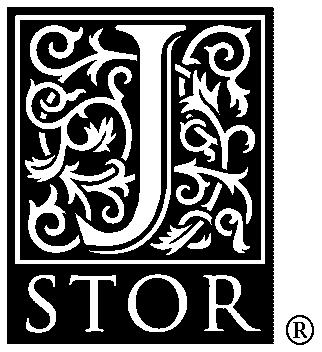
The Society of Biblical Literature is collaborating with JSTOR to digitize, preserve and extend access to Journal of Biblical Literature.
http://www.jstor.org
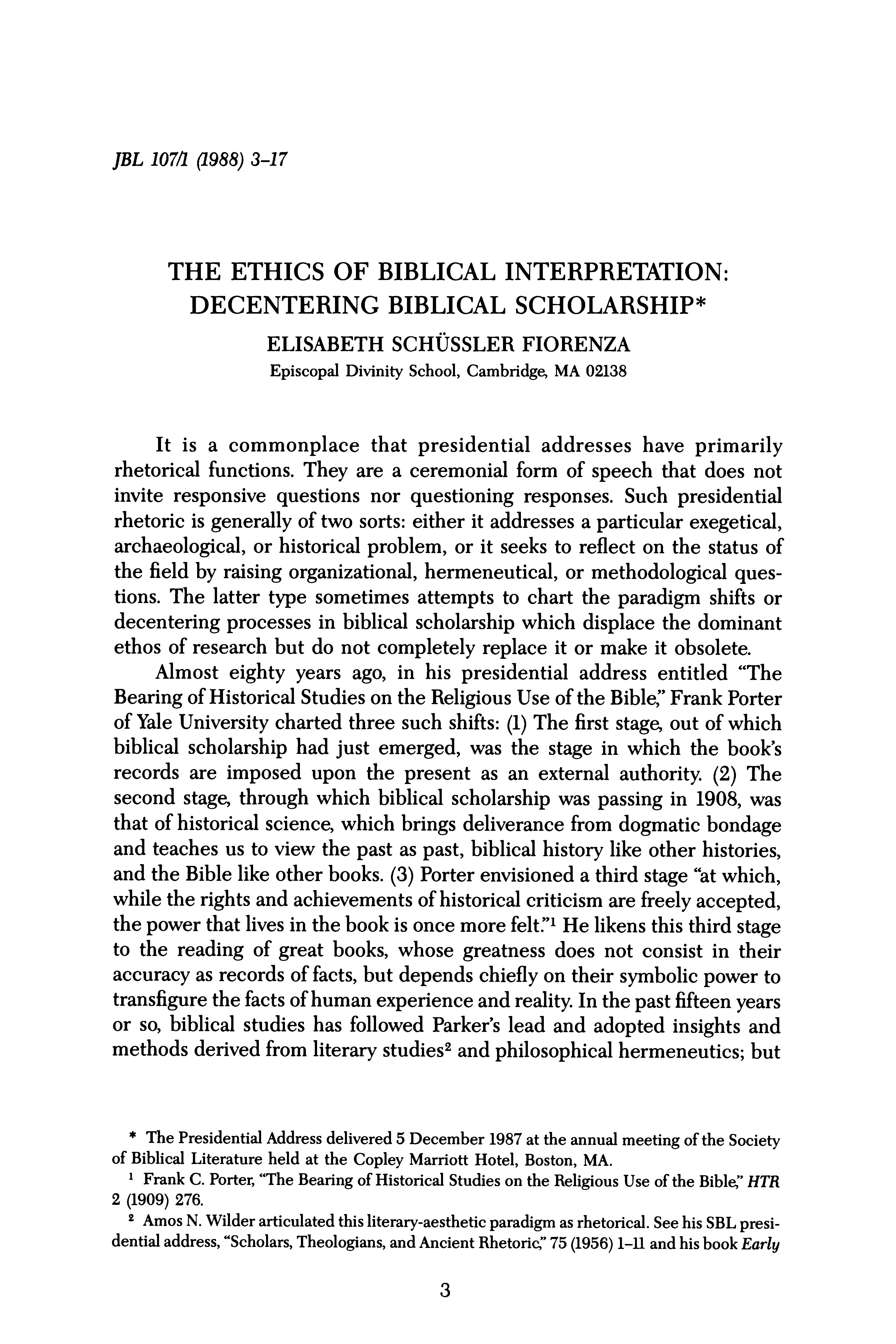
JBL107/1(1988)3-17
THE ETHICS OF BIBLICALINTERPRETATION: DECENTERING BIBLICAL SCHOLARSHIP*
ELISABETH SCHUSSLER FIORENZA Episcopal Divinity School, Cambridge,MA 02138It is a commonplace that presidential addresses have primarily rhetorical functions. They are a ceremonial form of speech that does not invite responsive questions nor questioning responses. Such presidential rhetoric is generally of two sorts:either it addresses a particularexegetical, archaeological, or historical problem, or it seeks to reflect on the status of the field by raising organizational,hermeneutical, or methodological questions. The latter type sometimes attempts to chart the paradigm shifts or decentering processes in biblical scholarship which displace the dominant ethos of research but do not completely replace it or make it obsolete.
Almost eighty years ago, in his presidential address entitled "The Bearingof Historical Studies on the ReligiousUse ofthe Bible,"'FrankPorter of YaleUniversity charted three such shifts:(1)The first stage,out of which biblical scholarship had just emerged, was the stage in which the book's records are imposed upon the present as an external authority. (2) The second stage, through which biblical scholarship was passing in 1908, was that of historical science, which brings deliverance from dogmatic bondage and teaches us to view the past as past, biblical history like other histories, and the Bible like other books. (3) Porterenvisioned a third stage "atwhich, while the rightsand achievements ofhistoricalcriticism arefreely accepted, the power thatlives in the book is once more felt.'' He likens this thirdstage to the reading of great books, whose greatness does not consist in their accuracyas records of facts,but depends chiefly on their symbolic power to transfigurethe factsofhumanexperience andreality.Inthe pastfifteen years or so, biblical studies has followed Parker'slead and adopted insights and methods derived fromliterarystudies2andphilosophical hermeneutics; but
* The PresidentialAddressdelivered 5 December 1987 at the annualmeeting of the Society of Biblical Literature held at the Copley MarriottHotel, Boston, MA.
FrankC. Porter,"TheBearingof Historical Studies on the Religious Use of the Bible"HTR 2 (1909) 276.
2 AmosN.Wilderarticulatedthisliterary-aestheticparadigmasrhetorical.See his SBLpresidential address,"Scholars,Theologians, andAncient Rhetoric"75 (1956)1-11andhisbookEarly
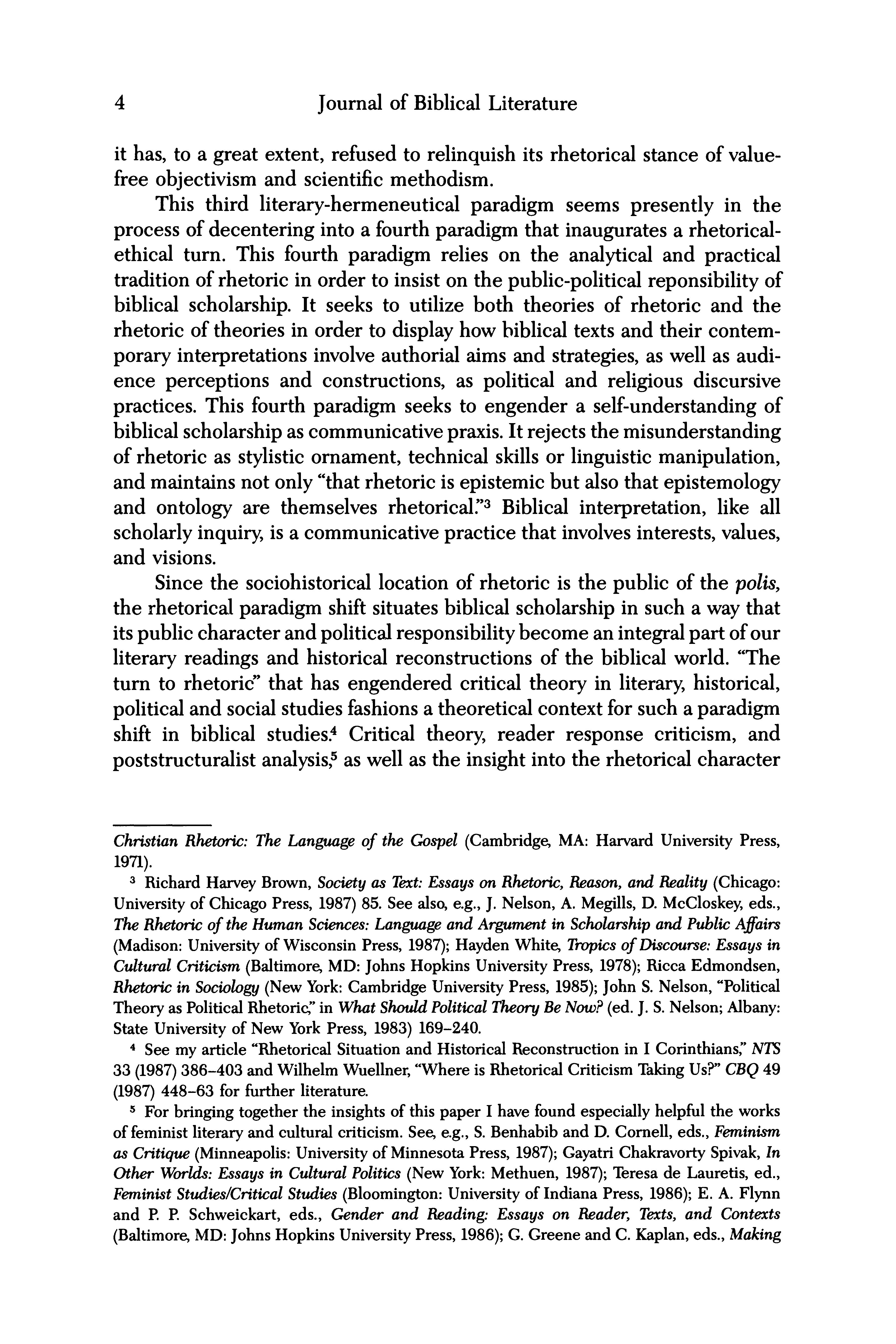
Journalof Biblical Literature
it has, to a great extent, refused to relinquish its rhetorical stance of valuefree objectivism and scientific methodism.
This third literary-hermeneutical paradigm seems presently in the process of decentering into a fourthparadigmthat inauguratesa rhetoricalethical turn. This fourth paradigm relies on the analytical and practical traditionof rhetoric in orderto insist on the public-political reponsibility of biblical scholarship. It seeks to utilize both theories of rhetoric and the rhetoric of theories in order to displayhow biblical texts and their contemporaryinterpretationsinvolve authorialaims and strategies, as well as audience perceptions and constructions, as political and religious discursive practices. This fourth paradigm seeks to engender a self-understanding of biblical scholarshipascommunicativepraxis.Itrejects the misunderstanding of rhetoric as stylistic ornament, technical skills or linguistic manipulation, andmaintainsnot only "thatrhetoric is epistemic but also that epistemology and ontology are themselves rhetorical"'3Biblical interpretation, like all scholarlyinquiry,is a communicative practice that involvesinterests, values, and visions.
Since the sociohistorical location of rhetoric is the public of the polis, the rhetoricalparadigmshift situates biblical scholarshipin such a waythat itspublic characterandpoliticalresponsibilitybecome anintegralpartofour literary readings and historical reconstructions of the biblical world. "The turn to rhetoric"that has engendered critical theory in literary,historical, political and social studies fashionsatheoretical context for such a paradigm shift in biblical studies. Critical theory, reader response criticism, and poststructuralistanalysis,5as well as the insight into the rhetoricalcharacter
Christian Rhetoric: The Language of the Gospel (Cambridge, MA: HarvardUniversity Press, 1971).
3 Richard HarveyBrown, Societyas Text:Essays on Rhetoric,Reason,and Reality (Chicago: University of Chicago Press, 1987) 85. See also, e.g., J. Nelson, A. Megills, D. McCloskey,eds., TheRhetoricof the HumanSciences:Languageand Argumentin Scholarshipand PublicAffairs (Madison:Universityof Wisconsin Press, 1987);Hayden White, Tropicsof Discourse:Essays in CulturalCriticism(Baltimore,MD: Johns Hopkins University Press, 1978);Ricca Edmondsen, Rhetoricin Sociology(New York:Cambridge UniversityPress, 1985);John S. Nelson, "Political Theory asPoliticalRhetoric"in WhatShouldPoliticalTheoryBeNow?(ed. J. S.Nelson; Albany: State University of New YorkPress, 1983) 169-240.
4 See my article "RhetoricalSituation and Historical Reconstruction in I Corinthians,:'NTS 33 (1987)386-403 and Wilhelm Wuellner,"Whereis Rhetorical Criticism TakingUs?"CBQ49 (1987) 448-63 for further literature.
5 For bringing together the insights of this paper I have found especially helpful the works of feminist literaryand culturalcriticism. See, e.g., S.Benhabib and D. Cornell, eds., Feminism as Critique(Minneapolis:Universityof Minnesota Press, 1987);GayatriChakravortySpivak,In Other Worlds:Essays in CulturalPolitics(New York:Methuen, 1987);Teresade Lauretis, ed., FeministStudies/CriticalStudies(Bloomington:University of Indiana Press, 1986); E. A. Flynn and P. P Schweickart, eds., Gender and Reading: Essays on Reader, Texts,and Contexts (Baltimore,MD:JohnsHopkins UniversityPress, 1986);G.Greene and C. Kaplan,eds., Making
Schiissler Fiorenza: The Ethics of Biblical Interpretation 5 and linguisticality of all historiography,represent the contemporary revival of ancient rhetoric.
The ethics of reading which respects the rights of the text and assumes that the text being interpreted "maysay something differentfrom what one wants or expects it to say,"6is highly developed in biblical studies. Therefore, I will focus here on the ethics of biblical scholarship as an institutionalized academic practice. I will approach the topic by marking my present rhetorical situation as a "connected critic"' who speaks from a marginal location and that of an engaged position. Then I will explore the rhetoric of SBL presidential addresses with respect to the shift from a scientific antiquarianto a critical-political ethos of biblical scholarship.Finally,I will indicate what kind of communicative practice such a shift implies.
I. SOCIAL LOCATIONAND BIBLICAL CRITICISM
In distinction to formalistliterarycriticism, a critical theory of rhetoric insists that context is as important as text. What we see depends on where we stand. One'ssocial location or rhetorical context is decisive of how one sees the world, constructs reality, or interprets biblical texts. My own rhetorical situation is marked by what Virginia Woolf, in her book Three Guineas,has characterized as the "outsider'sview":
It is a solemnsightalways - a processionlike a caravanseraicrossinga desert.Great-grandfather,grandfathers,fathers,uncles- theyallwentthat waywearingtheirgowns,wearingtheirwigs,somewithribbonsacross theirbreasts,otherswithout.Onewasabishop.Anotherajudge.Onewas anadmiral.Anotherageneral.Onewasaprofessor.Anotheradoctor.... Butnowforthe pasttwentyyearsor so,it is no longera sightmerely,a photograph... atwhichwecanlookwithmerelyanestheticappreciation. Forthere,trapesingalongatthetailendoftheprocession,wegoourselves. Andthatmakesa difference.
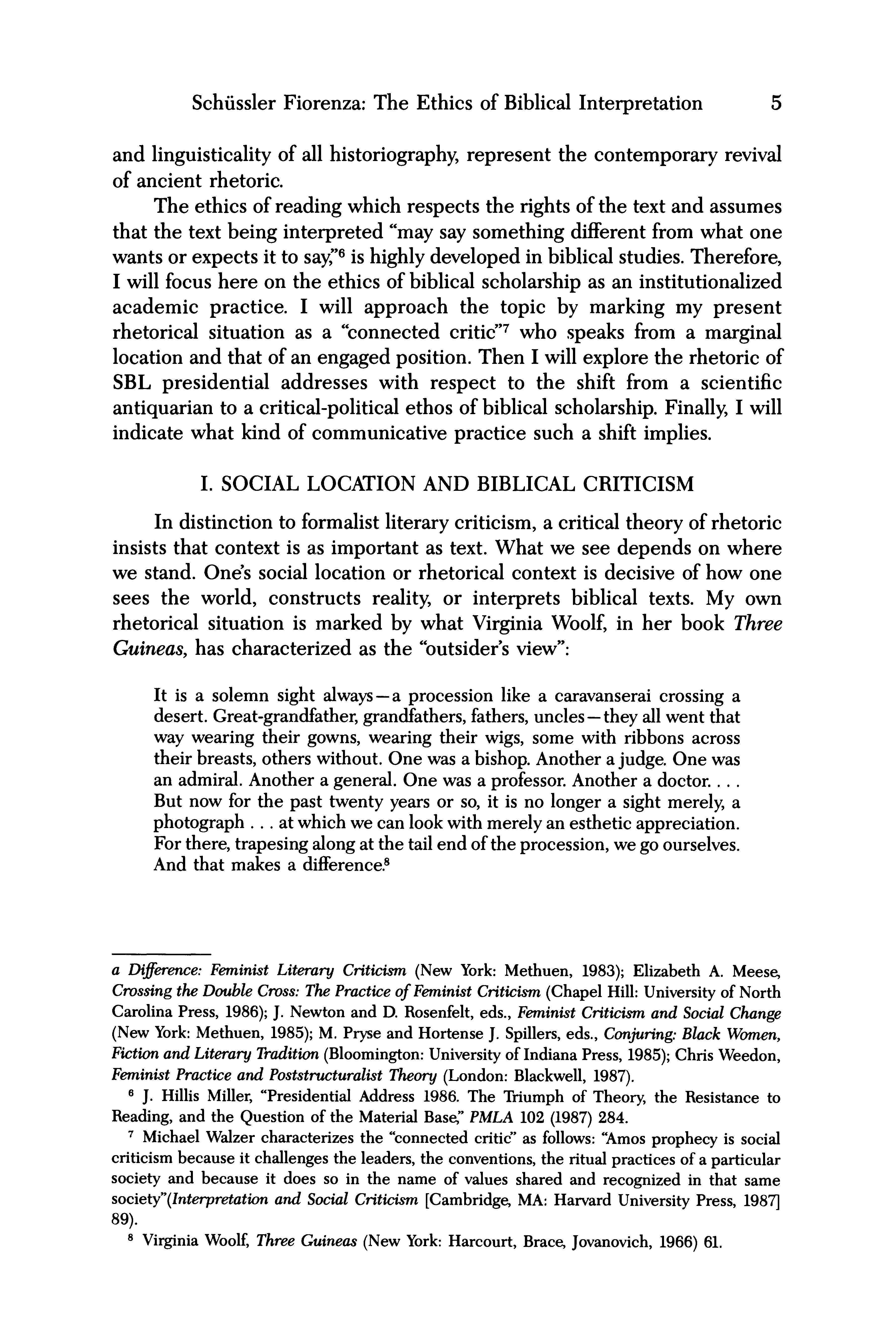
a Difference:Feminist Literary Criticism (New York:Methuen, 1983); Elizabeth A. Meese, Crossingthe Double Cross:ThePracticeof FeministCriticism(Chapel Hill: Universityof North Carolina Press, 1986);J. Newton and D. Rosenfelt, eds., FeministCriticismand Social Change (New York:Methuen, 1985); M. Pryse and Hortense J. Spillers,eds., Conjuring:Black Women, Fictionand LiteraryTradition(Bloomington:Universityof IndianaPress, 1985);Chris Weedon, FeministPracticeand PoststructuralistTheory(London: Blackwell, 1987).
6 J. Hillis Miller, "Presidential Address 1986. The Triumph of Theory, the Resistance to Reading, and the Question of the MaterialBase,"PMLA102 (1987) 284.
7 Michael Walzer characterizes the "connected critic"as follows: "Amosprophecy is social criticism because it challenges the leaders, the conventions, the ritualpractices of a particular society and because it does so in the name of values shared and recognized in that same society"(Interpretationand Social Criticism [Cambridge,MA:HarvardUniversity Press, 1987] 89).
8 VirginiaWoolf, ThreeGuineas (New York:Harcourt, Brace,Jovanovich, 1966) 61.
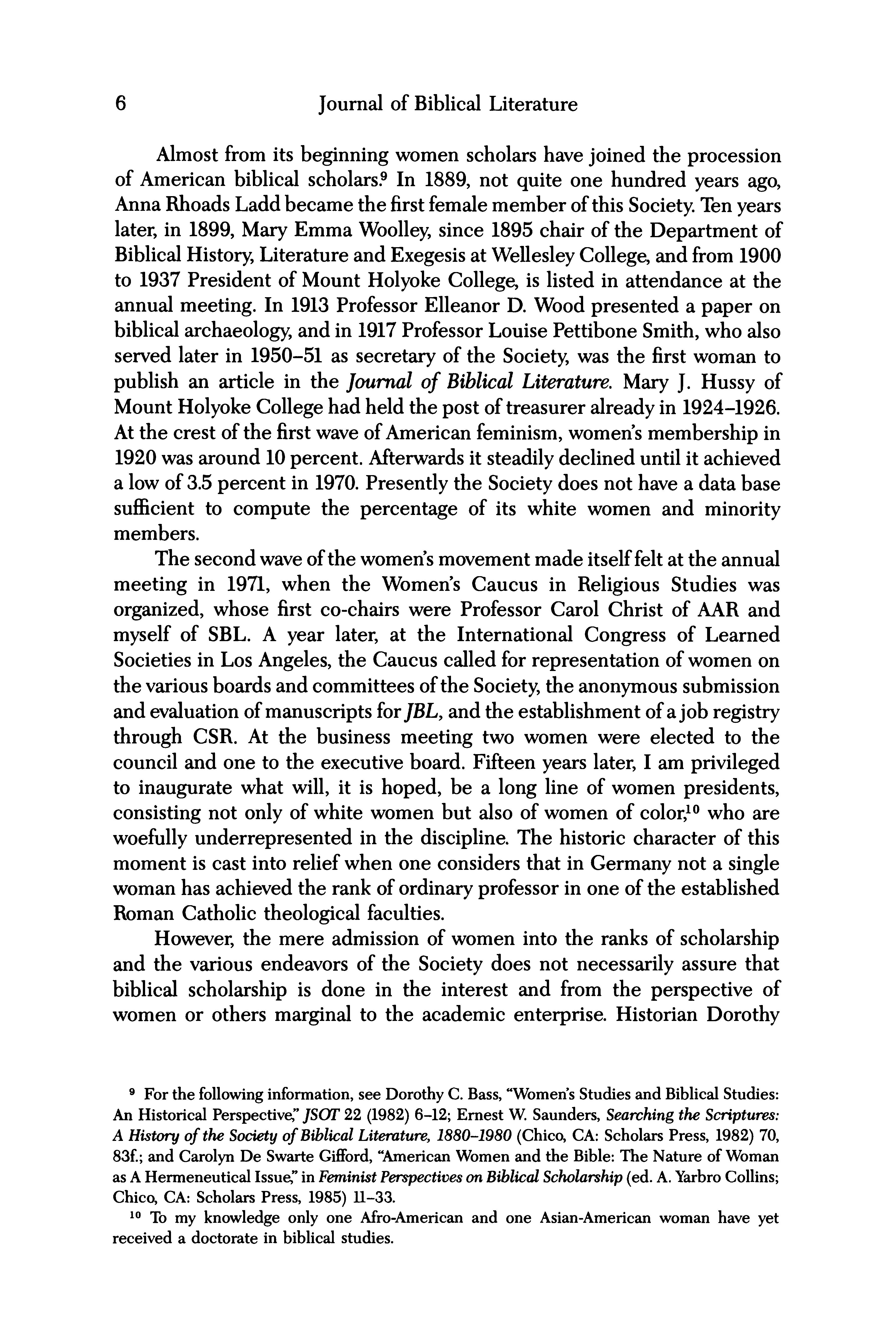
Journalof Biblical Literature
Almost from its beginning women scholars havejoined the procession of American biblical scholars? In 1889, not quite one hundred years ago, AnnaRhoadsLaddbecame the firstfemale member ofthis Society.Tenyears later,in 1899, MaryEmma Woolley,since 1895 chair of the Department of Biblical History,LiteratureandExegesis atWellesleyCollege, andfrom1900 to 1937 President of Mount Holyoke College, is listed in attendance at the annual meeting. In 1913Professor Elleanor D. Woodpresented a paper on biblical archaeology,andin 1917ProfessorLouise Pettibone Smith,who also served later in 1950-51 as secretary of the Society, was the first woman to publish an article in the Journal of Biblical Literature.Mary J. Hussy of Mount Holyoke College hadheld the post oftreasureralreadyin 1924-1926. Atthe crest of the firstwaveofAmericanfeminism, women'smembership in 1920 wasaround10percent. Afterwardsit steadilydeclined until it achieved a low of 3.5 percent in 1970.Presently the Society does not havea database sufficient to compute the percentage of its white women and minority members.
The second waveofthe women'smovement made itself felt atthe annual meeting in 1971, when the Women's Caucus in Religious Studies was organized, whose first co-chairs were Professor Carol Christ of AAR and myself of SBL. A year later, at the International Congress of Learned Societies in Los Angeles, the Caucus called forrepresentation of women on the variousboardsandcommittees ofthe Society,the anonymoussubmission andevaluationofmanuscriptsforJBL,andthe establishment ofajob registry through CSR. At the business meeting two women were elected to the council and one to the executive board. Fifteen yearslater,I am privileged to inaugurate what will, it is hoped, be a long line of women presidents, consisting not only of white women but also of women of color,'0who are woefully underrepresented in the discipline. The historic character of this moment is cast into relief when one considers that in Germanynot a single woman has achieved the rankof ordinaryprofessorin one of the established Roman Catholic theological faculties.
However, the mere admission of women into the ranksof scholarship and the various endeavors of the Society does not necessarily assure that biblical scholarship is done in the interest and from the perspective of women or others marginal to the academic enterprise. Historian Dorothy
9 Forthe followinginformation,see Dorothy C. Bass,"Women'sStudies and Biblical Studies: An Historical Perspective"JSOT22 (1982) 6-12; Ernest W Saunders,Searchingthe Scriptures: A Historyof the Societyof Biblical Literature,1880-1980 (Chico, CA:ScholarsPress, 1982) 70, 83f.; and CarolynDe SwarteGifford,"AmericanWomen and the Bible: The Nature of Woman asAHermeneutical Issue"in FeministPerspectivesonBiblicalScholarship(ed. A.YarbroCollins; Chico, CA: Scholars Press, 1985) 11-33.
10 To my knowledge only one Afro-Americanand one Asian-Americanwoman have yet received a doctorate in biblical studies.
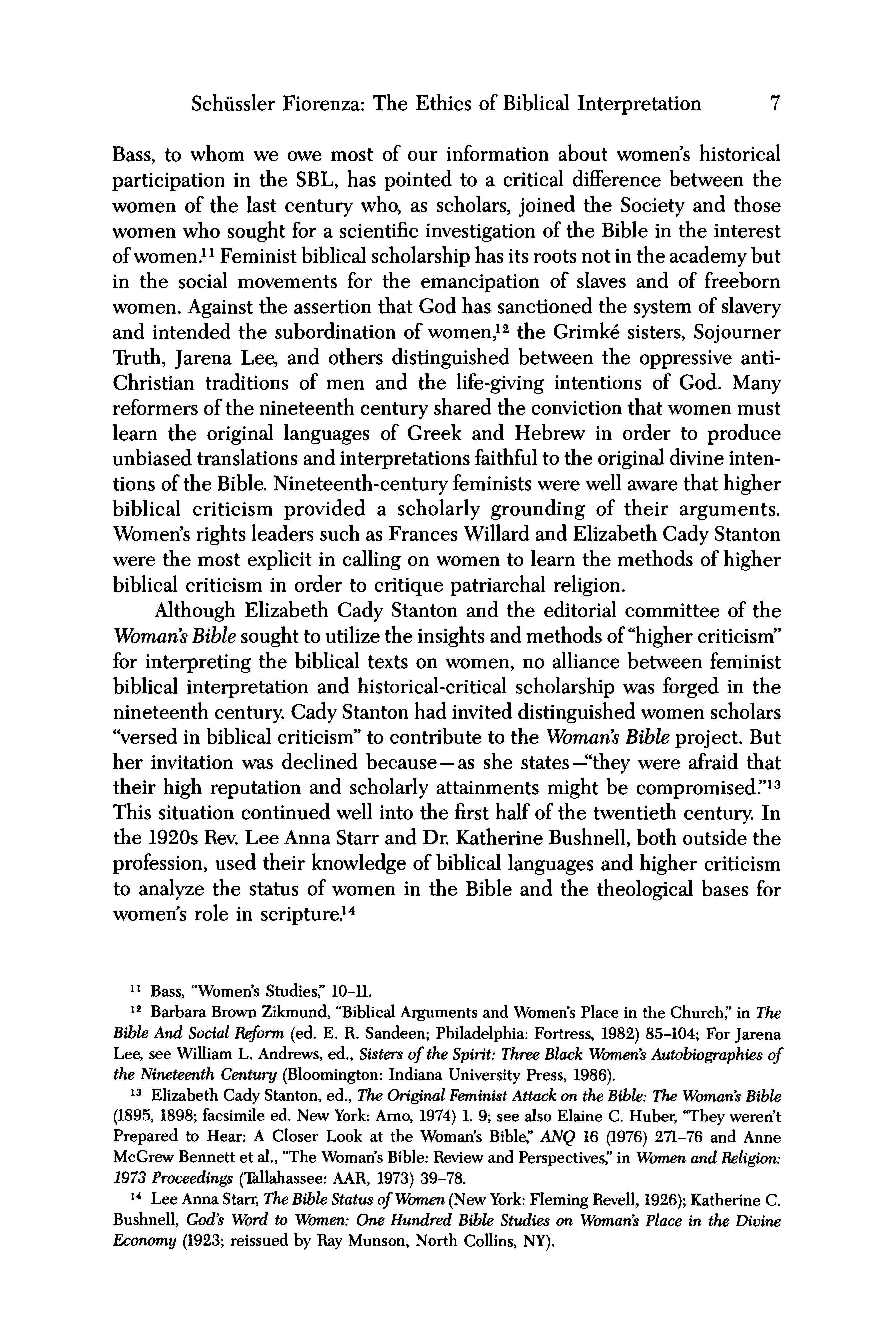
SchuisslerFiorenza:
The Ethics of Biblical Interpretation 7
Bass, to whom we owe most of our information about women's historical participation in the SBL, has pointed to a critical difference between the women of the last century who, as scholars,joined the Society and those women who sought for a scientific investigation of the Bible in the interest ofwomen." Feminist biblical scholarshiphasitsrootsnot in the academybut in the social movements for the emancipation of slaves and of freeborn women. Againstthe assertion that God has sanctioned the system of slavery and intended the subordination of women,'2 the Grimk6 sisters, Sojourner Truth, Jarena Lee, and others distinguished between the oppressive antiChristian traditions of men and the life-giving intentions of God. Many reformersof the nineteenth century sharedthe conviction that women must learn the original languages of Greek and Hebrew in order to produce unbiased translationsandinterpretationsfaithfulto the originaldivine intentions of the Bible. Nineteenth-century feminists were well awarethat higher biblical criticism provided a scholarly grounding of their arguments. Women'srightsleaders such as Frances Willardand Elizabeth Cady Stanton were the most explicit in calling on women to learn the methods of higher biblical criticism in order to critique patriarchalreligion.
Although Elizabeth Cady Stanton and the editorial committee of the Woman'sBiblesoughttoutilize the insights andmethods of"highercriticism" for interpreting the biblical texts on women, no alliance between feminist biblical interpretation and historical-critical scholarship was forged in the nineteenth century.Cady Stantonhad invited distinguished women scholars "versedin biblical criticism"to contribute to the Woman'sBibleproject. But her invitation was declined because-as she states-"they were afraidthat their high reputation and scholarly attainments might be compromised"'3 This situation continued well into the firsthalf of the twentieth century. In the 1920s Rev.Lee Anna Starrand Dr.KatherineBushnell, both outside the profession, used their knowledge of biblical languages and higher criticism to analyze the status of women in the Bible and the theological bases for women's role in scripture.4
11 Bass, "Women'sStudies,' 10-11.
12 BarbaraBrownZikmund,"BiblicalArguments andWomen'sPlace in the Church,' in The Bible And Social Reform(ed. E. R. Sandeen; Philadelphia: Fortress, 1982) 85-104; ForJarena Lee, see William L. Andrews,ed., Sistersof the Spirit:ThreeBlack Women'sAutobiographiesof the NineteenthCentury(Bloomington: Indiana University Press, 1986).
~3Elizabeth Cady Stanton,ed., TheOriginalFeministAttackon theBible:TheWoman'sBible (1895, 1898; facsimile ed. New York:Arno, 1974) 1. 9; see also Elaine C. Huber,"Theyweren't Prepared to Hear: A Closer Look at the Woman'sBible,"ANQ 16 (1976) 271-76 and Anne McGrewBennett et al., "TheWoman'sBible: Reviewand Perspectives,"'in Womenand Religion: 1973 Proceedings(Tallahassee:AAR, 1973) 39-78.
14 Lee AnnaStarr,TheBibleStatusof Women(New York:Fleming Revell, 1926);KatherineC. Bushnell, God's Wordto Women:One Hundred Bible Studies on Woman'sPlace in the Divine Economy (1923;reissued by RayMunson, North Collins, NY).
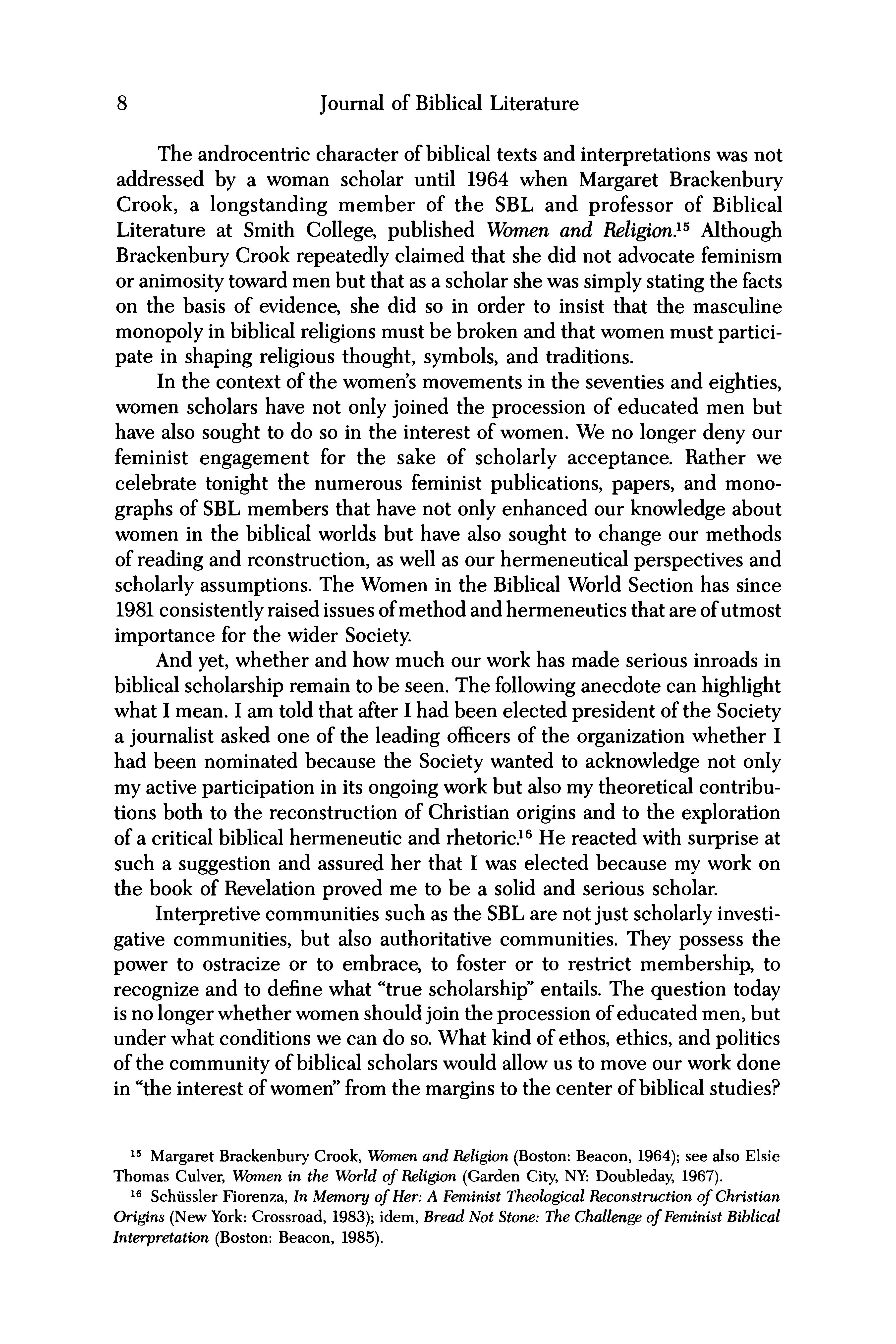
Journalof Biblical Literature
The androcentriccharacterof biblical texts andinterpretationswas not addressed by a woman scholar until 1964 when Margaret Brackenbury Crook, a longstanding member of the SBL and professor of Biblical Literature at Smith College, published Womenand Religion.'5Although BrackenburyCrook repeatedly claimed that she did not advocate feminism oranimositytowardmen but thatasascholarshe wassimplystatingthe facts on the basis of evidence, she did so in order to insist that the masculine monopoly in biblical religionsmust be brokenandthat women must participate in shaping religious thought, symbols, and traditions.
In the context of the women'smovements in the seventies and eighties, women scholars have not only joined the procession of educated men but have also sought to do so in the interest of women. We no longer deny our feminist engagement for the sake of scholarly acceptance. Rather we celebrate tonight the numerous feminist publications, papers, and monographs of SBL members that have not only enhanced our knowledge about women in the biblical worlds but have also sought to change our methods of readingand rconstruction, as well as our hermeneutical perspectives and scholarly assumptions. The Women in the Biblical WorldSection has since 1981consistently raisedissues ofmethod andhermeneutics thatareofutmost importance for the wider Society.
And yet, whether and how much ourworkhas made serious inroadsin biblical scholarshipremainto be seen. The followinganecdote can highlight what I mean. I amtold that afterI hadbeen elected president ofthe Society a journalist asked one of the leading officers of the organizationwhether I had been nominated because the Society wanted to acknowledge not only my active participationin its ongoing workbut also mytheoretical contributions both to the reconstruction of Christian origins and to the exploration of a critical biblical hermeneutic and rhetoric.6 He reacted with surpriseat such a suggestion and assured her that I was elected because my work on the book of Revelationproved me to be a solid and serious scholar.
Interpretivecommunities such asthe SBLarenotjust scholarlyinvestigative communities, but also authoritative communities. They possess the power to ostracize or to embrace, to foster or to restrict membership, to recognize and to define what "truescholarship"entails. The question today isnolongerwhether women shouldjoin the procession ofeducated men, but under what conditions we can do so.What kind of ethos, ethics, andpolitics of the community of biblical scholarswould allowus to move ourworkdone in "theinterest ofwomen"fromthe marginsto the center ofbiblical studies?
~5MargaretBrackenburyCrook, Womenand Religion(Boston:Beacon, 1964); see also Elsie Thomas Culver, Womenin the Worldof Religion(Garden City, NY:Doubleday, 1967).
16 SchuisslerFiorenza, In Memoryof Her:A FeministTheologicalReconstructionof Christian Origins(New York:Crossroad,1983);idem, BreadNot Stone:TheChallengeof FeministBiblical Interpretation(Boston:Beacon, 1985).
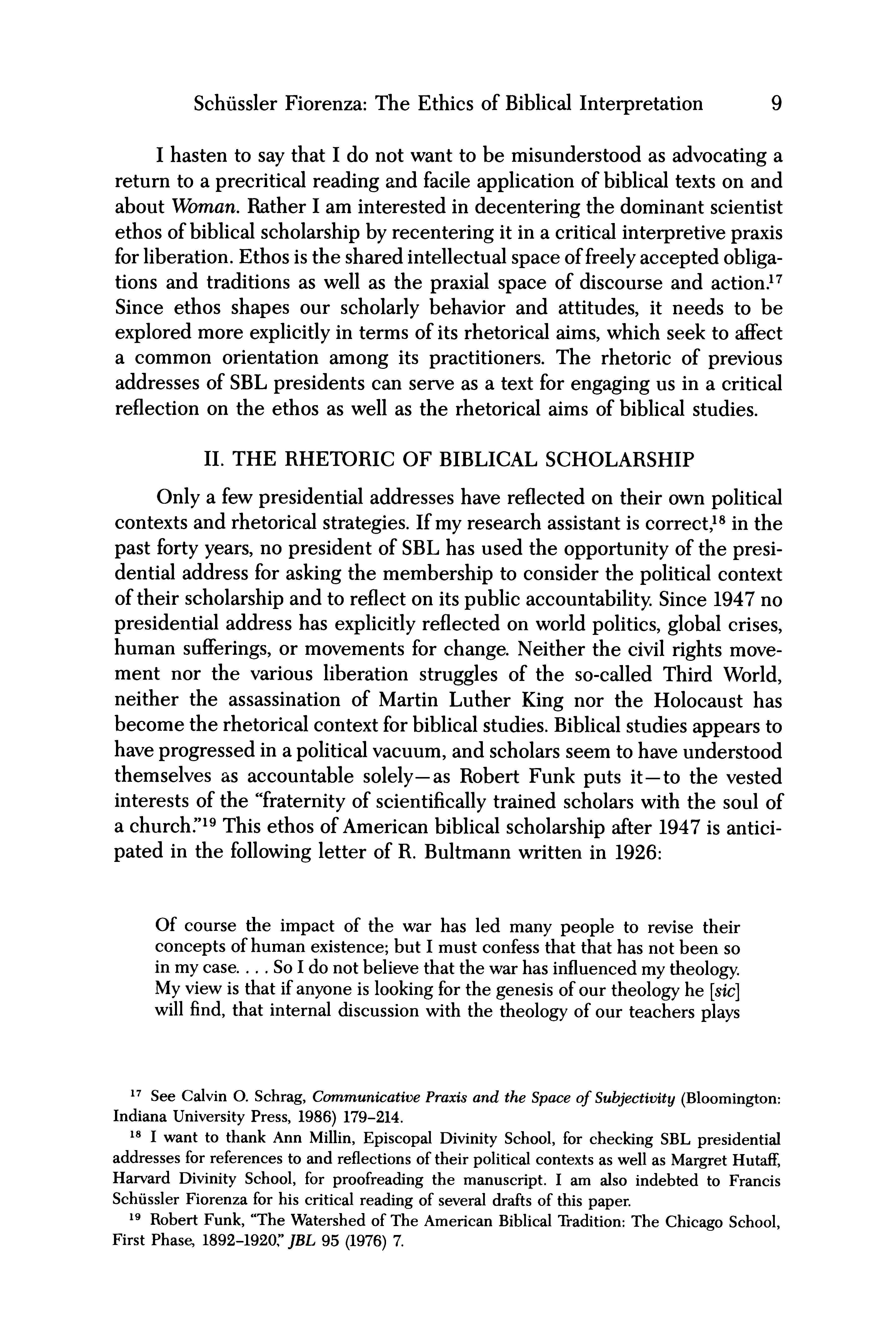 Schiissler Fiorenza:
Schiissler Fiorenza:
The Ethics of Biblical Interpretation 9
I hasten to saythat I do not want to be misunderstood as advocatinga returnto a precritical reading and facile application of biblical texts on and about Woman.RatherI am interested in decentering the dominant scientist ethos of biblical scholarshipby recentering it in a critical interpretivepraxis forliberation. Ethos isthe sharedintellectual space offreelyaccepted obligations and traditions as well as the praxial space of discourse and action.7 Since ethos shapes our scholarly behavior and attitudes, it needs to be explored more explicitly in terms of its rhetorical aims,which seek to affect a common orientation among its practitioners. The rhetoric of previous addresses of SBLpresidents can serve as a text for engaging us in a critical reflection on the ethos as well as the rhetorical aims of biblical studies.
II. THE RHETORIC OF BIBLICAL SCHOLARSHIP
Only a few presidential addresses have reflected on their own political contexts and rhetoricalstrategies.Ifmy researchassistantis correct,'8in the past fortyyears,no president of SBL has used the opportunity of the presidential address for asking the membership to consider the political context of their scholarshipand to reflect on its public accountability.Since 1947 no presidential address has explicitly reflected on world politics, global crises, human sufferings,or movements for change. Neither the civil rights movement nor the various liberation struggles of the so-called Third World, neither the assassination of Martin Luther King nor the Holocaust has become the rhetoricalcontext forbiblical studies. Biblical studies appearsto haveprogressed in apolitical vacuum, and scholarsseem to haveunderstood themselves as accountable solely-as Robert Funk puts it-to the vested interests of the "fraternityof scientifically trained scholars with the soul of a church:'"9This ethos of American biblical scholarshipafter 1947 is anticipated in the following letter of R. Bultmann written in 1926:
Of coursethe impactof the warhas led manypeople to revisetheir conceptsofhumanexistence;butI mustconfessthatthathasnotbeenso inmycase.... SoIdonotbelievethatthewarhasinfluencedmytheology. Myviewisthatifanyoneislookingforthegenesisofourtheologyhe [sic] willfind,thatinternaldiscussionwiththe theologyofourteachersplays
17 See Calvin O. Schrag, CommunicativePraxisand the Spaceof Subjectivity(Bloomington: Indiana University Press, 1986) 179-214.
18 I want to thank Ann Millin, Episcopal Divinity School, for checking SBL presidential addresses for references to and reflections of their political contexts as well as MargretHutaff, Harvard Divinity School, for proofreading the manuscript. I am also indebted to Francis Schiissler Fiorenza for his critical reading of several draftsof this paper.
~9 Robert Funk, "TheWatershedof The American Biblical Tradition:The Chicago School, First Phase, 1892-1920:'JBL 95 (1976) 7.
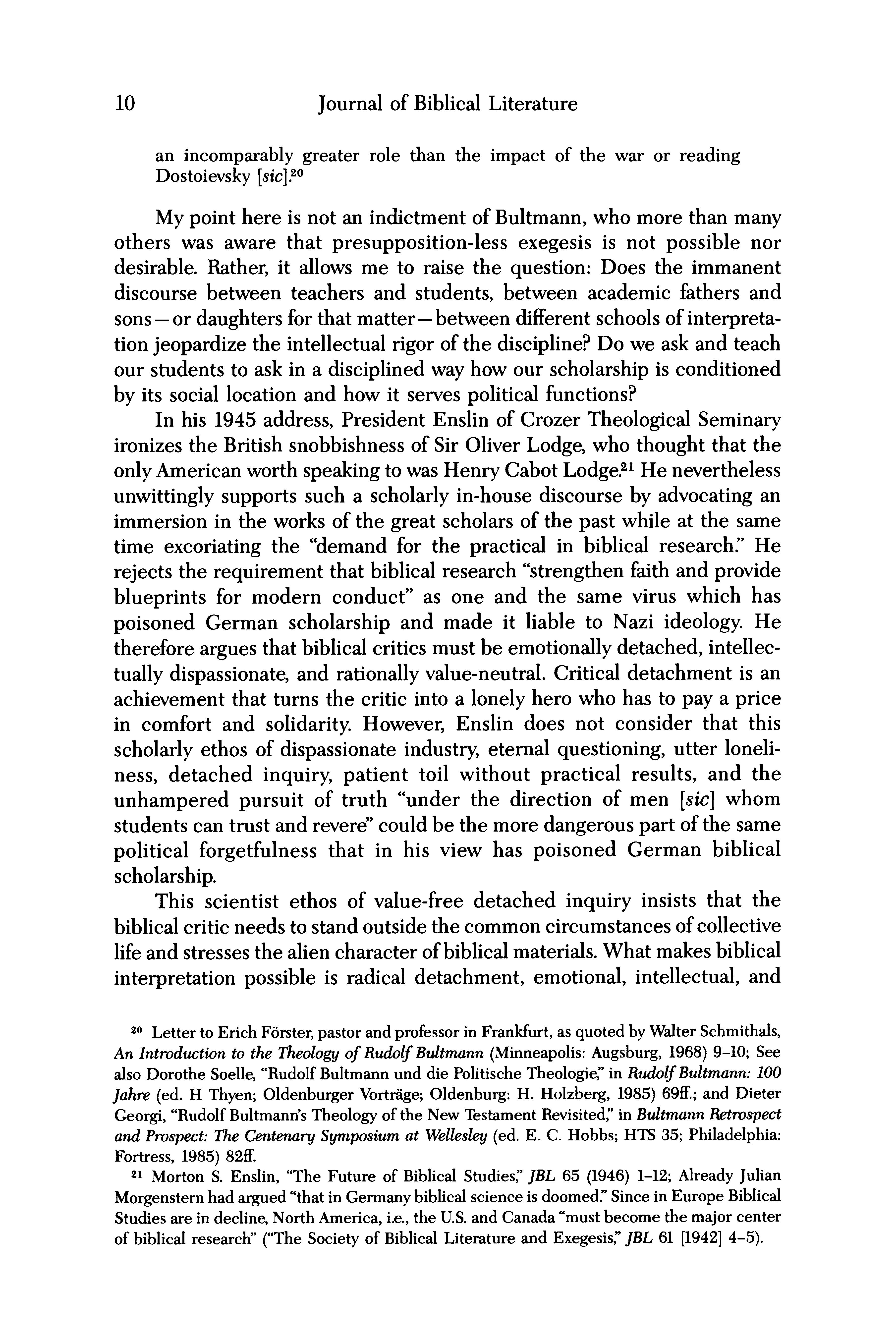
Journalof Biblical Literature
an incomparablygreaterrole than the impactof the war or reading Dostoievsky[sic].o
Mypoint here is not an indictment of Bultmann,who more than many others was aware that presupposition-less exegesis is not possible nor desirable. Rather,it allows me to raise the question: Does the immanent discourse between teachers and students, between academic fathers and sons- or daughtersforthatmatter- between differentschools of interpretation jeopardize the intellectual rigorof the discipline? Do we askand teach our students to askin a disciplined wayhow our scholarship is conditioned by its social location and how it serves political functions?
In his 1945 address, President Enslin of Crozer Theological Seminary ironizes the British snobbishness of SirOliver Lodge, who thought that the onlyAmericanworthspeakingtowasHenry CabotLodge.' He nevertheless unwittingly supports such a scholarly in-house discourse by advocating an immersion in the works of the great scholars of the past while at the same time excoriating the "demand for the practical in biblical research:' He rejects the requirement that biblical research "strengthenfaithand provide blueprints for modern conduct" as one and the same virus which has poisoned German scholarship and made it liable to Nazi ideology. He therefore arguesthatbiblical critics must be emotionally detached, intellectually dispassionate, and rationallyvalue-neutral. Critical detachment is an achievement that turns the critic into a lonely hero who has to pay a price in comfort and solidarity. However, Enslin does not consider that this scholarly ethos of dispassionate industry,eternal questioning, utter loneliness, detached inquiry, patient toil without practical results, and the unhampered pursuit of truth "under the direction of men [sic] whom students can trustandrevere"could be the more dangerouspartof the same political forgetfulness that in his view has poisoned German biblical scholarship.
This scientist ethos of value-free detached inquiry insists that the biblical critic needs to standoutside the common circumstances ofcollective life andstressesthe alien characterofbiblicalmaterials.What makesbiblical interpretation possible is radical detachment, emotional, intellectual, and
20 Letter to Erich F6rster,pastorandprofessorin Frankfurt,as quoted by WalterSchmithals, An Introductionto the Theologyof RudolfBultmann(Minneapolis:Augsburg, 1968) 9-10; See also Dorothe Soelle, "RudolfBultmannund die Politische Theologie"'in RudolfBultmann:100 Jahre (ed. H Thyen; Oldenburger Vortrdige;Oldenburg: H. Holzberg, 1985) 69ff.; and Dieter Georgi, "RudolfBultmann'sTheology of the New TestamentRevisited:'in BultmannRetrospect and Prospect:TheCentenarySymposiumat Wellesley(ed. E. C. Hobbs; HTS 35; Philadelphia: Fortress, 1985) 82ff.
21 Morton S. Enslin, "The Future of Biblical Studies,'JBL 65 (1946) 1-12; Already Julian Morgensternhad argued"thatin Germanybiblical science is doomed:'Since in Europe Biblical Studies arein decline, North America,i.e.,the U.S.and Canada"mustbecome the majorcenter of biblical research"("TheSociety of Biblical Literature and Exegesis,"JBL 61 [1942]4-5).
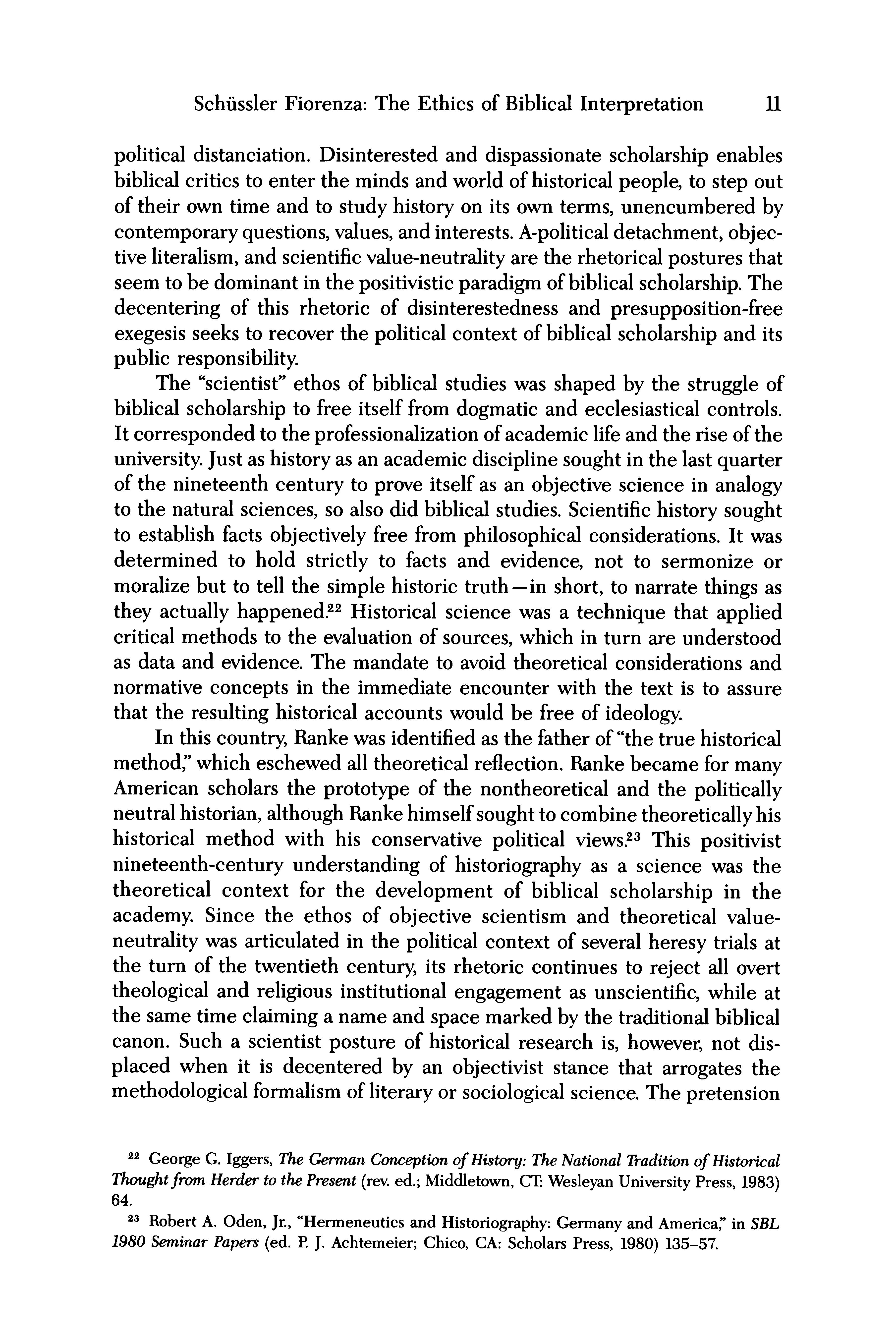 Schiissler Fiorenza: The
Schiissler Fiorenza: The
Ethics of Biblical Interpretation 11
political distanciation. Disinterested and dispassionate scholarship enables biblical critics to enter the minds and world of historicalpeople, to step out of their own time and to study history on its own terms, unencumbered by contemporaryquestions, values,andinterests.A-politicaldetachment, objective literalism,and scientific value-neutralityarethe rhetoricalpostures that seem to be dominantin the positivistic paradigmof biblical scholarship.The decentering of this rhetoric of disinterestedness and presupposition-free exegesis seeks to recover the political context of biblical scholarshipand its public responsibility.
The "scientist"ethos of biblical studies was shaped by the struggle of biblical scholarship to free itself from dogmatic and ecclesiastical controls. It corresponded to the professionalizationof academic life andthe rise ofthe university.Justashistoryasanacademic discipline sought in the last quarter of the nineteenth century to prove itself as an objective science in analogy to the naturalsciences, so also did biblical studies. Scientific history sought to establish facts objectively free from philosophical considerations. It was determined to hold strictly to facts and evidence, not to sermonize or moralize but to tell the simple historic truth-in short, to narratethings as they actually happened.22Historical science was a technique that applied critical methods to the evaluationof sources, which in turn are understood as data and evidence. The mandate to avoid theoretical considerations and normative concepts in the immediate encounter with the text is to assure that the resulting historical accounts would be free of ideology.
In this country,Rankewasidentified as the fatherof"thetrue historical method,' which eschewed all theoretical reflection. Rankebecame formany American scholars the prototype of the nontheoretical and the politically neutralhistorian,althoughRankehimself soughtto combine theoretically his historical method with his conservative political views.3 This positivist nineteenth-century understanding of historiographyas a science was the theoretical context for the development of biblical scholarship in the academy. Since the ethos of objective scientism and theoretical valueneutrality was articulated in the political context of several heresy trials at the turn of the twentieth century, its rhetoric continues to reject all overt theological and religious institutional engagement as unscientific, while at the same time claiming a name and space markedby the traditionalbiblical canon. Such a scientist posture of historical research is, however,not displaced when it is decentered by an objectivist stance that arrogates the methodological formalismof literaryor sociological science. The pretension
22 George G. Iggers, TheGermanConceptionof History:TheNational Traditionof Historical Thoughtfrom Herderto the Present(rev.ed.; Middletown, CT:WesleyanUniversityPress, 1983) 64.
23 Robert A. Oden, Jr.,"Hermeneutics and Historiography:Germanyand America:'in SBL 1980 SeminarPapers(ed. P J. Achtemeier; Chico, CA: Scholars Press, 1980) 135-57.
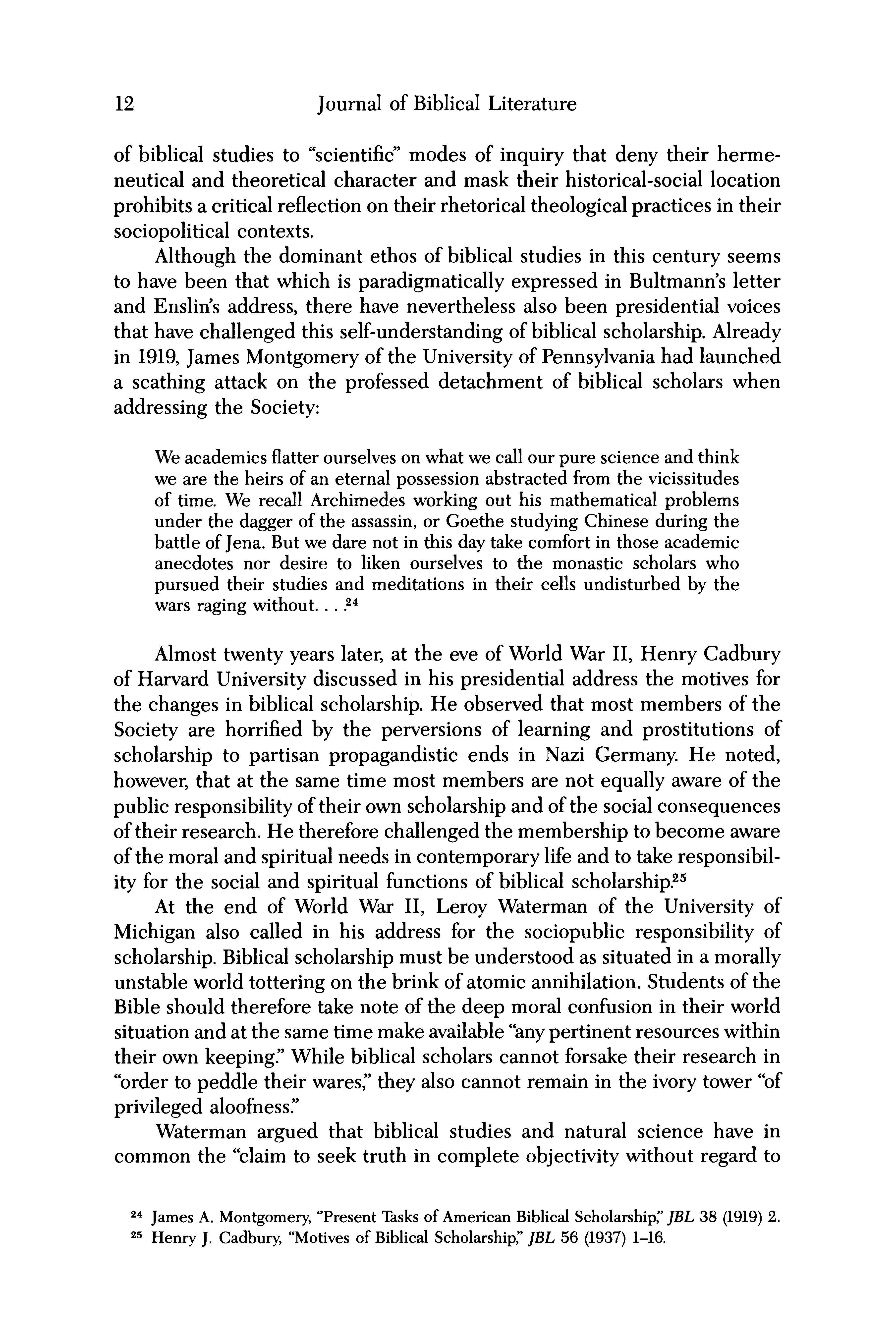
Journalof Biblical Literature
of biblical studies to "scientific"modes of inquiry that deny their hermeneutical and theoretical character and mask their historical-social location prohibitsacriticalreflection on their rhetoricaltheological practices in their sociopolitical contexts.
Although the dominant ethos of biblical studies in this century seems to have been that which is paradigmaticallyexpressed in Bultmann'sletter and Enslin'saddress, there have nevertheless also been presidential voices that have challenged this self-understandingof biblical scholarship.Already in 1919,James Montgomeryof the Universityof Pennsylvaniahad launched a scathing attack on the professed detachment of biblical scholars when addressing the Society:
Weacademicsflatterourselvesonwhatwecallourpurescienceandthink wearetheheirsofaneternalpossessionabstractedfromthevicissitudes of time.WerecallArchimedesworkingout his mathematicalproblems underthedaggeroftheassassin,orGoethestudyingChineseduringthe battleofJena.Butwedarenotinthisdaytakecomfortinthoseacademic anecdotesnor desireto liken ourselvesto the monasticscholarswho pursuedtheirstudiesandmeditationsin theircells undisturbedbythe warsragingwithout....24
Almost twenty yearslater,at the eve of WorldWarII, Henry Cadbury of HarvardUniversity discussed in his presidential address the motives for the changes in biblical scholarship.He observed that most members of the Society are horrified by the perversions of learning and prostitutions of scholarship to partisan propagandistic ends in Nazi Germany.He noted, however,that at the same time most members are not equally awareof the public responsibilityoftheir own scholarshipandofthe social consequences of their research.He thereforechallenged the membership to become aware of the moralandspiritualneeds in contemporarylife andto takeresponsibility for the social and spiritualfunctions of biblical scholarship?5
At the end of World War II, Leroy Waterman of the University of Michigan also called in his address for the sociopublic responsibility of scholarship.Biblical scholarshipmust be understood as situated in a morally unstable worldtottering on the brinkof atomic annihilation.Students of the Bible should therefore take note of the deep moralconfusion in their world situationandatthe sametime makeavailable"anypertinent resourceswithin their own keeping."While biblical scholars cannot forsaketheir research in "orderto peddle their wares,'they also cannot remain in the ivorytower"of privileged aloofness.
Waterman argued that biblical studies and natural science have in common the "claimto seek truth in complete objectivity without regardto
24 James A. Montgomery,"PresentTasksof American Biblical Scholarship,'JBL38 (1919)2.
25 Henry J. Cadbury,"Motivesof Biblical Scholarship,' JBL56 (1937) 1-16.
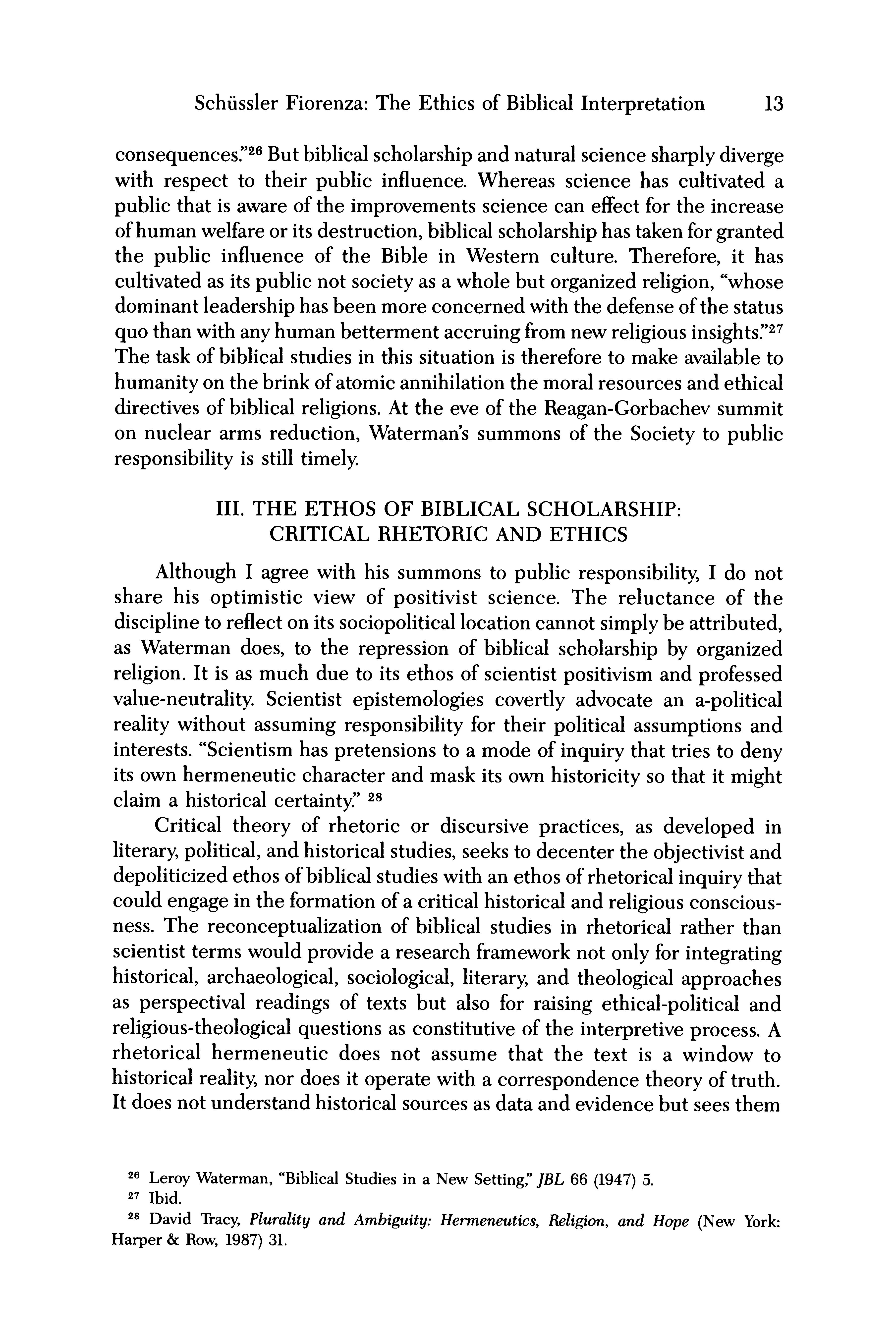
Schiissler Fiorenza: The Ethics of Biblical Interpretation 13 consequences."26 Butbiblical scholarshipandnaturalscience sharplydiverge with respect to their public influence. Whereas science has cultivated a public that is awareof the improvements science can effect for the increase ofhumanwelfareorits destruction, biblical scholarshiphastakenforgranted the public influence of the Bible in Western culture. Therefore, it has cultivated as its public not society as a whole but organizedreligion, "whose dominantleadershiphasbeen more concerned with the defense ofthe status quo thanwith anyhumanbetterment accruingfromnew religiousinsights.'27 The taskof biblical studies in this situation is therefore to make availableto humanityon the brinkofatomic annihilationthe moralresources andethical directives of biblical religions. At the eve of the Reagan-Gorbachevsummit on nuclear arms reduction, Waterman'ssummons of the Society to public responsibility is still timely.
III. THE ETHOS OF BIBLICAL SCHOLARSHIP: CRITICAL RHETORIC AND ETHICS
Although I agree with his summons to public responsibility, I do not share his optimistic view of positivist science. The reluctance of the discipline to reflect on its sociopolitical location cannot simplybe attributed, as Waterman does, to the repression of biblical scholarship by organized religion. It is as much due to its ethos of scientist positivism and professed value-neutrality. Scientist epistemologies covertly advocate an a-political reality without assuming responsibility for their political assumptions and interests. "Scientismhas pretensions to a mode of inquiry that tries to deny its own hermeneutic characterand mask its own historicity so that it might claim a historical certainty'"28
Critical theory of rhetoric or discursive practices, as developed in literary,political, andhistoricalstudies, seeks to decenter the objectivist and depoliticized ethos ofbiblical studies with an ethos of rhetoricalinquirythat could engage in the formationof a criticalhistoricaland religious consciousness. The reconceptualization of biblical studies in rhetorical rather than scientist terms would provide a research frameworknot only forintegrating historical, archaeological, sociological, literary,and theological approaches as perspectival readings of texts but also for raising ethical-political and religious-theological questions as constitutive of the interpretive process. A rhetorical hermeneutic does not assume that the text is a window to historical reality,nor does it operate with a correspondence theory of truth. It does not understandhistorical sources as dataandevidence but sees them
26 Leroy Waterman,"Biblical Studies in a New Setting,"JBL 66 (1947) 5.
27 Ibid.
28 David Tracy,Plurality and Ambiguity: Hermeneutics, Religion, and Hope (New York: Harper& Row, 1987) 31.
Journalof Biblical Literature
asperspectivaldiscourse constructing their worldsand symbolic universes.9
Since alternativesymbolic universes engender competing definitions of the world, they cannot be reduced to one meaning. Therefore, competing interpretations of texts are not simply either right or wrong,0 but they constitute differentwaysofreadingand constructinghistoricalmeaning. Not detached value-neutrality but an explicit articulation of one's rhetorical strategies, interested perspectives, ethical criteria, theoretical frameworks, religious presuppositions, and sociopolitical locations for critical public discussion are appropriate in such a rhetorical paradigm of biblical scholarship.
The rhetorical understandingof discourse as creating a world of pluriform meanings and a pluralismof symbolic universes,raises the question of power.How is meaning constructed?Whose interests areserved?What kind of worlds are envisoned? What roles, duties, and values are advocated? Which social-political practices are legitimated? Or which communities of discourse signresponsible?Suchandsimilarquestions become centralto the interpretive task. Once biblical scholarshipbegins to talkexplicitly of social interests, whether of race, gender, culture, or class, and once it begins to recognize the need for a sophisticated and pluralistic reading of texts that questions the fixity of meaning, then a double ethics is called for.
An ethics of historical reading changes the task of interpretation from finding out "whatthe text meant"to the question of what kind of readings can do justice to the text in its historical contexts. Although such an ethics is awareof the pluralism of historical- and literary-criticalmethods as well as the pluralism of interpretations appropriate to the text, it nevertheless insists that the number of interpretations that can legitimately be given to a text are limited. Such a historical reading seeks to give the text its due by asserting its original meanings over and againstlater dogmatic usurpations. It makes the assimilation of the text to our own experience and interests more difficultand thereby keeps alive the "irritation"of the originaltext by challenging our own assumptions, world views, and practices. In short, the methods of historical- and literary-critical scholarship and its diachronic reconstructions distance us in such a way from the original texts and their historical symbolic worlds that they relativize not only them but also us. By illuminating the ethical-political dimensions of the biblical text in its historical contexts, such an ethics of historical reading allows us not only to relativize through contextualization the values and authority claims of the biblical text but also to assess and critically evaluate them.
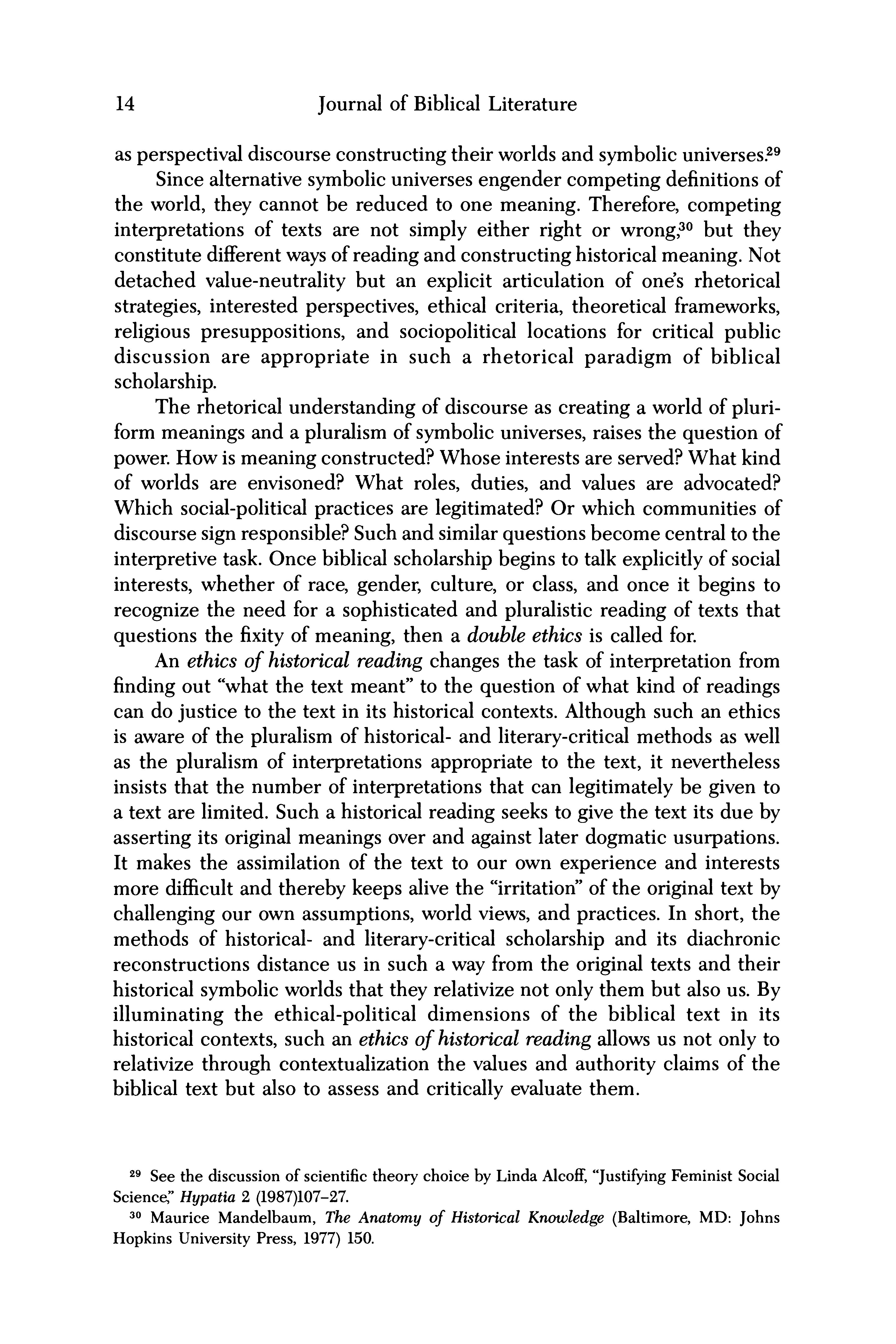
29 See the discussion of scientific theory choice by LindaAlcoff, "JustifyingFeminist Social Science,"Hypatia 2 (1987)107-27.
30 Maurice Mandelbaum, The Anatomy of Historical Knowledge (Baltimore, MD: Johns Hopkins University Press, 1977) 150.
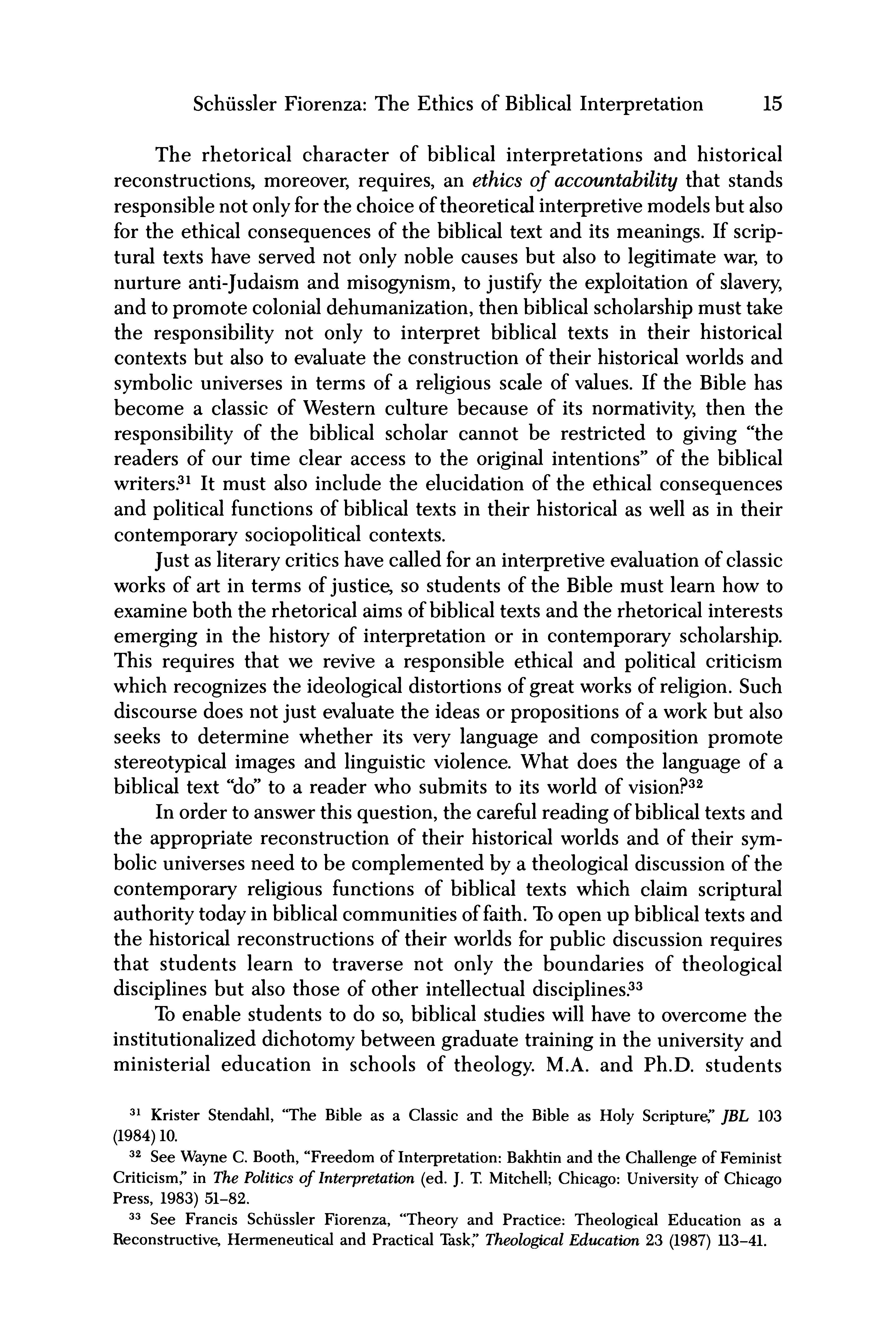 Schiissler Fiorenza:
Schiissler Fiorenza:
The Ethics of Biblical Interpretation 15
The rhetorical character of biblical interpretations and historical reconstructions, moreover,requires, an ethics of accountability that stands responsible not onlyforthe choice oftheoretical interpretivemodels but also for the ethical consequences of the biblical text and its meanings. If scriptural texts have served not only noble causes but also to legitimate war,to nurture anti-Judaismand misogynism, to justify the exploitation of slavery, andtopromote colonial dehumanization,then biblical scholarshipmust take the responsibility not only to interpret biblical texts in their historical contexts but also to evaluate the construction of their historical worlds and symbolic universes in terms of a religious scale of values. If the Bible has become a classic of Western culture because of its normativity,then the responsibility of the biblical scholar cannot be restricted to giving "the readers of our time clear access to the original intentions" of the biblical writers31It must also include the elucidation of the ethical consequences and political functions of biblical texts in their historical as well as in their contemporary sociopolitical contexts.
Justasliterarycritics havecalled foraninterpretiveevaluationof classic works of art in terms of justice, so students of the Bible must learn how to examine both the rhetoricalaimsof biblical texts andthe rhetoricalinterests emerging in the history of interpretation or in contemporary scholarship. This requires that we revive a responsible ethical and political criticism which recognizes the ideological distortions of great worksof religion. Such discourse does not just evaluatethe ideas or propositions of a workbut also seeks to determine whether its very language and composition promote stereotypical images and linguistic violence. What does the language of a biblical text "do"to a reader who submits to its world of vision?32
In orderto answerthis question, the carefulreadingofbiblical texts and the appropriatereconstruction of their historical worlds and of their symbolic universes need to be complemented by a theological discussion of the contemporary religious functions of biblical texts which claim scriptural authoritytodayin biblical communities offaith.Toopen up biblical texts and the historical reconstructions of their worlds for public discussion requires that students learn to traverse not only the boundaries of theological disciplines but also those of other intellectual disciplines33
Toenable students to do so, biblical studies will have to overcome the institutionalized dichotomy between graduatetrainingin the universityand ministerial education in schools of theology. M.A. and Ph.D. students
31 Krister Stendahl, "The Bible as a Classic and the Bible as Holy Scripture,"JBL 103 (1984)10.
32 See WayneC. Booth, "Freedomof Interpretation:Bakhtinand the Challenge of Feminist Criticism,"in ThePolitics of Interpretation(ed. J. T Mitchell; Chicago: University of Chicago Press, 1983) 51-82.
33 See Francis Schfissler Fiorenza, "Theory and Practice: Theological Education as a Reconstructive, Hermeneutical and Practical Task,'TheologicalEducation 23 (1987) 113-41.
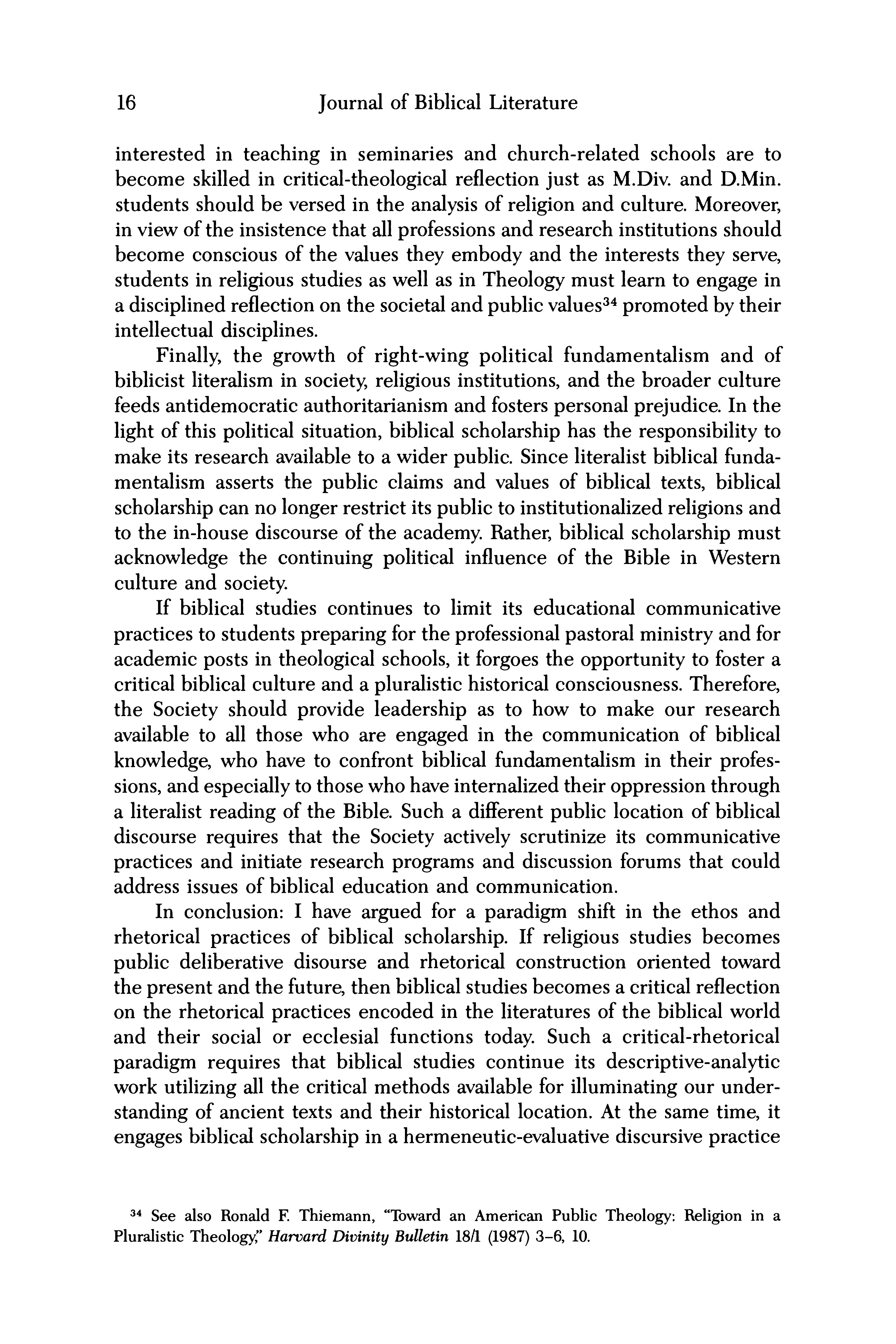
Journalof Biblical Literature
interested in teaching in seminaries and church-related schools are to become skilled in critical-theological reflection just as M.Div. and D.Min. students should be versed in the analysisof religion and culture. Moreover, in view of the insistence that allprofessions and researchinstitutions should become conscious of the values they embody and the interests they serve, students in religious studies as well as in Theology must learn to engage in a disciplined reflection on the societal andpublic values34promoted bytheir intellectual disciplines.
Finally, the growth of right-wing political fundamentalism and of biblicist literalism in society, religious institutions, and the broader culture feeds antidemocratic authoritarianismandfosterspersonalprejudice. In the light of this political situation, biblical scholarshiphas the responsibility to make its research availableto a wider public. Since literalist biblical fundamentalism asserts the public claims and values of biblical texts, biblical scholarshipcan no longer restrict its public to institutionalized religions and to the in-house discourse of the academy.Rather,biblical scholarship must acknowledge the continuing political influence of the Bible in Western culture and society.
If biblical studies continues to limit its educational communicative practices to students preparingforthe professionalpastoralministryandfor academic posts in theological schools, it forgoes the opportunity to foster a critical biblical culture and a pluralistichistorical consciousness. Therefore, the Society should provide leadership as to how to make our research available to all those who are engaged in the communication of biblical knowledge, who have to confront biblical fundamentalism in their professions, andespecially to those who haveinternalizedtheir oppressionthrough a literalist reading of the Bible. Such a different public location of biblical discourse requires that the Society actively scrutinize its communicative practices and initiate research programsand discussion forums that could address issues of biblical education and communication.
In conclusion: I have argued for a paradigm shift in the ethos and rhetorical practices of biblical scholarship. If religious studies becomes public deliberative disourse and rhetorical construction oriented toward the present andthe future,then biblical studies becomes a criticalreflection on the rhetorical practices encoded in the literatures of the biblical world and their social or ecclesial functions today. Such a critical-rhetorical paradigm requires that biblical studies continue its descriptive-analytic work utilizing all the critical methods availablefor illuminating our understanding of ancient texts and their historical location. At the same time, it engages biblical scholarshipin a hermeneutic-evaluative discursivepractice
34 See also Ronald F Thiemann, "Towardan American Public Theology: Religion in a Pluralistic Theology,"HarvardDivinity Bulletin 18/1 (1987)3-6, 10.
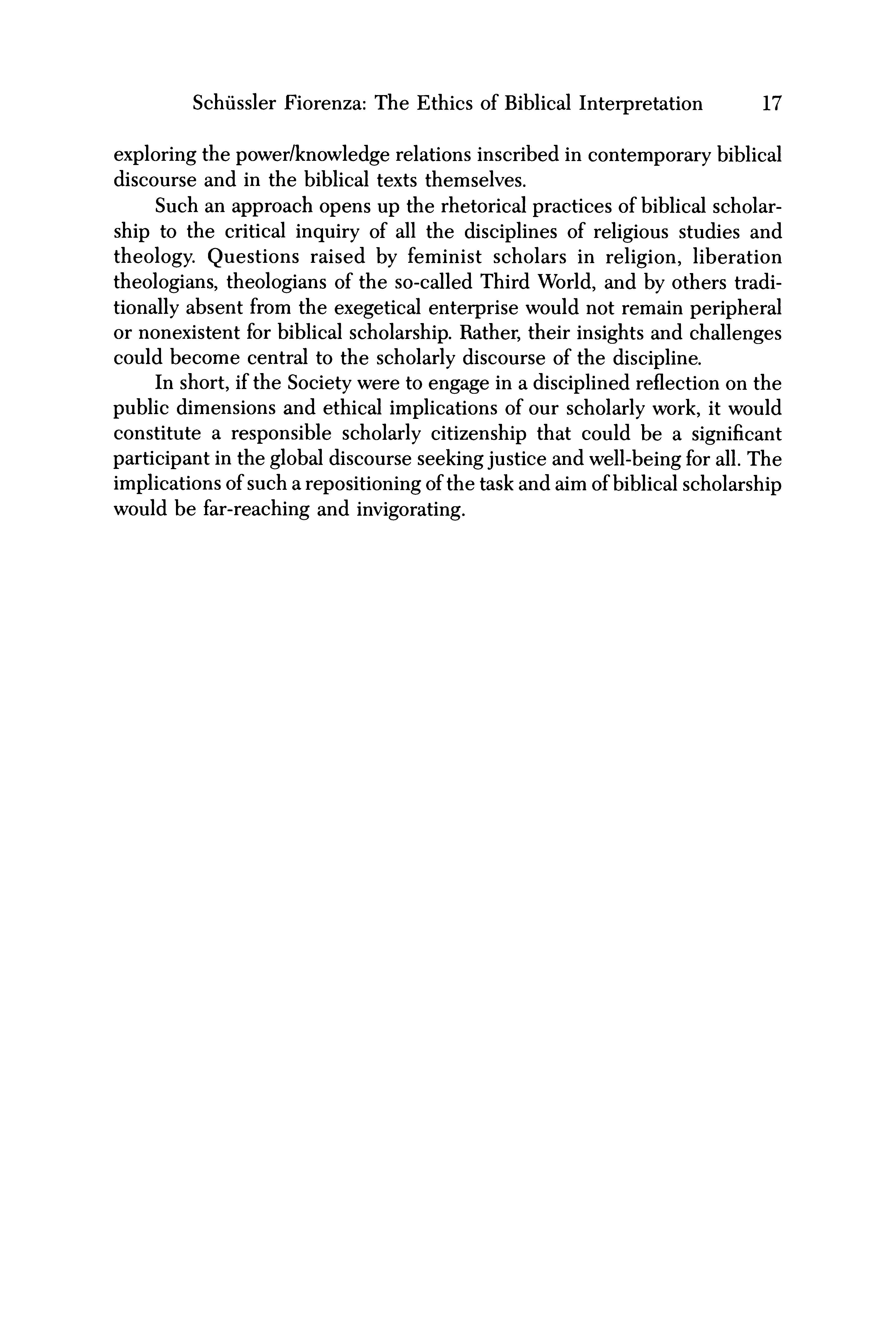
Schiissler Fiorenza: The Ethics of Biblical Interpretation 17
exploring the power/knowledge relations inscribed in contemporarybiblical discourse and in the biblical texts themselves.
Such an approachopens up the rhetoricalpractices of biblical scholarship to the critical inquiry of all the disciplines of religious studies and theology. Questions raised by feminist scholars in religion, liberation theologians, theologians of the so-called Third World, and by others traditionally absent from the exegetical enterprise would not remain peripheral or nonexistent for biblical scholarship.Rather,their insights and challenges could become central to the scholarly discourse of the discipline.
In short, if the Society were to engage in a disciplined reflection on the public dimensions and ethical implications of our scholarly work, it would constitute a responsible scholarly citizenship that could be a significant participantin the global discourse seekingjustice andwell-being forall. The implicationsofsuch arepositioningofthe taskandaimofbiblical scholarship would be far-reachingand invigorating.
